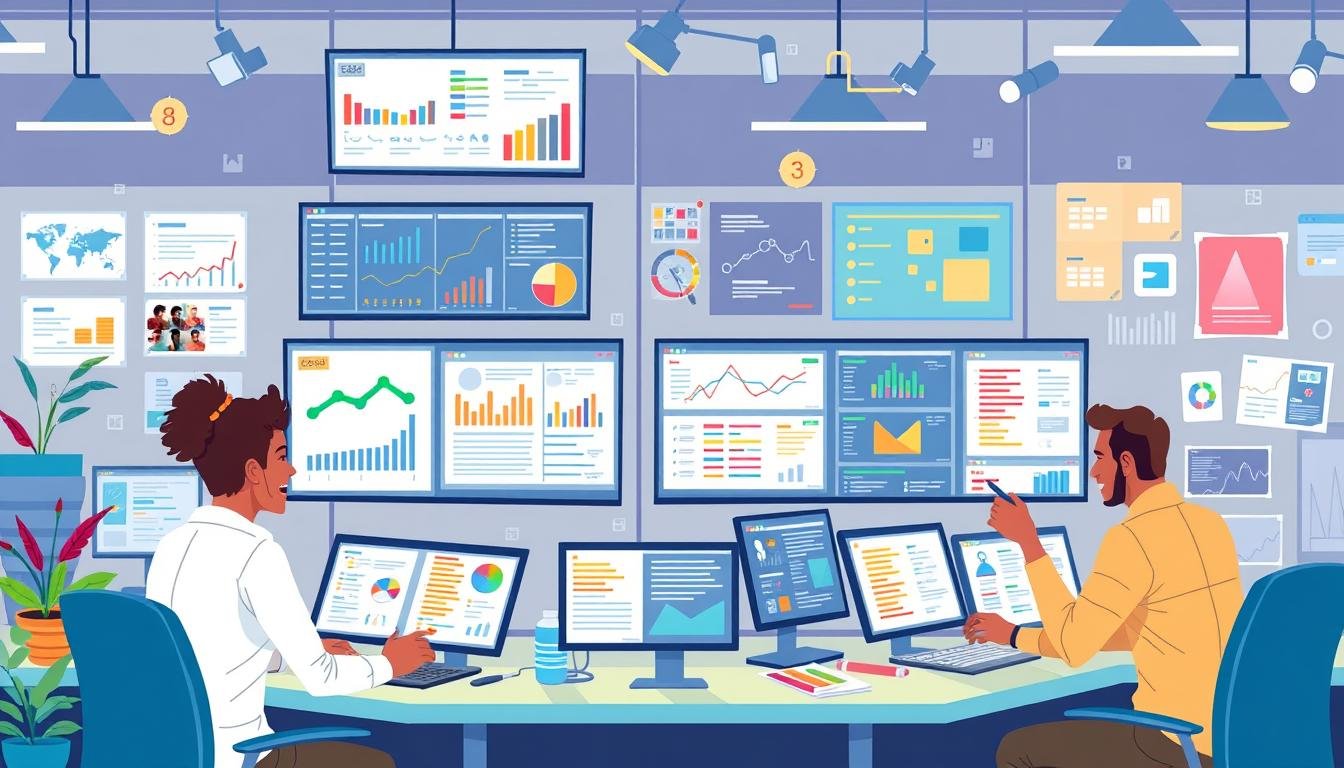Data is now the key to success for businesses and organizations. The global Big Data and analytics market is worth $274 billion. It has changed how we make decisions, run operations, and innovate in many fields. I’m excited to see how data analytics is changing business and shaping our society’s future.
Big Data analytics deals with many types of data. It uses advanced methods like Natural Language Processing and sentiment analysis. This helps organizations make better decisions, spot trends, and stay ahead of rivals.
The effect of Big Data analytics on businesses is huge. It changes how we work, manage supply chains, and use resources. Companies that use this technology can make their workflows smoother, automate tasks, and use resources better. This leads to more productivity and profit.
Key Takeaways
- The global Big Data and analytics market is valued at $274 billion, highlighting the industry’s significance.
- Big Data analytics encompasses diverse data types, requiring advanced techniques to derive valuable insights.
- Data-driven decision-making leads to increased accuracy and enables organizations to outperform competitors.
- Big Data analytics has revolutionized business operations, improving efficiency, supply chain management, and resource allocation.
- Companies leveraging Big Data analytics can optimize workflows, automate tasks, and allocate resources more efficiently.
Understanding Big Data Analytics
In today’s fast-changing data world, “big data” means lots of information. Businesses and groups must deal with huge amounts of data. To use big data analytics well, knowing its main features is key.
Volume
The first thing about big data is how much there is. Our world is getting more digital by the day. This means a lot of data is being made every day. Companies need good storage, like cloud-based systems, to handle all this data.
Velocity
The speed of data is also very important. Big data needs fast processing to keep up with new data. This is why stream processing and in-memory databases are used. They help get insights quickly for making smart choices.
Variety
Big data comes in many types, like structured and unstructured data. To get useful insights, natural language processing and sentiment analysis are used. These help with data like text, images, and videos.
Knowing about volume, velocity, and variety helps businesses use big data analytics. This can lead to better decisions, better customer service, and new chances for growth.
“Big data is at the foundation of all the megatrends that are happening today, from social to mobile to the cloud to gaming.”
– Chris Lynch, CEO of Alation
How Big Data Analytics Enhances Business Decision Accuracy And Reduces Uncertainty
In today’s fast-paced business world, data-driven decision making is key to success. Big Data analytics turns huge amounts of data into useful insights. This helps leaders understand consumer behavior, market trends, and industry patterns.
With tools like Machine Learning and predictive analytics, making accurate decisions becomes easier. This leads to better risk management and more confident choices. As a result, businesses can stay ahead of their rivals.
- 95% of companies need to properly structure an immense amount of ‘difficult to interpret data’ to grow.
- Night sales for a grocery chain increased by a third within months after implementing changes based on data analysis.
- Businesses can predict future trends by analyzing past data, aiding them in proactive decision-making.
| Benefit | Impact |
|---|---|
| Improved Customer Experience | Data analytics leads to hyper-personalized offerings, boosting customer retention. |
| Cost Optimization | Automation and cloud computing help in streamlining business operations and cutting costs. |
| Fueling Innovation | Data analytics identifies new trends and consumer demands in the market. |
By using Big Data analytics, businesses can confidently navigate the complex market. They make decisions that boost growth, improve efficiency, and secure a strong competitive edge.
“Sixty-three percent of respondents reported that the use of information, including big data and analytics, creates a competitive advantage for their organizations.”
The Impact of Big Data On Business Operations
The rise of Big Data analytics has changed business operations a lot. Companies now use lots of data to improve their workflows and make better decisions. This helps them manage their supply chains better and keep customers happy.
Improving Operational Efficiency And Productivity
Big Data analytics helps businesses understand their operations better. They can find ways to improve operational efficiency and productivity. By looking at real-time data, they can spot problems and make smart choices to fix them.
Enhancing Supply Chain Management Through Data Insights
Big Data analytics has changed how companies manage their supply chains. They use data from suppliers, transportation, and customer needs to stay ahead. This helps them avoid problems and keep their inventory and distribution networks running smoothly.
Optimizing Resource Allocation And Cost Management
Big Data analytics helps businesses manage their resources and costs better. They can see where money is going and plan for the future. This way, they can use their resources wisely and save money.
“Big Data analytics has transformed the way businesses operate, enabling them to streamline processes, enhance productivity, and make more informed decisions across their operations.”
The global big data market is expected to grow to $103 billion by 2027. This means Big Data analytics will have an even bigger impact on business operations. Companies that use this technology will be more efficient, innovative, and competitive.
Ways To Overcome The Challenges And Risks
Businesses face big changes with cloud computing and big data. They must tackle data management challenges and risks. It’s key to keep data safe and private, using strong encryption and following new rules.
Handling lots of data needs good data management tools. Cloud computing and distributed storage help a lot.
Keeping data quality high is also crucial. This means having strict data governance rules and cleaning data well. Using automation and data stewardship makes data better for analysis.
Addressing Data Privacy and Security Concerns
- Use strong encryption to protect sensitive info
- Set up access controls and user checks to stop unauthorized access
- Follow new data privacy laws, like GDPR and CCPA
Taming Big Data Volumes
- Use cloud computing to grow with data needs
- Choose distributed storage for big data management
- Automate data handling to work better
Ensuring Data Quality and Reliability
| Strategy | Impact |
|---|---|
| Data Governance | Creates rules and standards for data management |
| Data Cleansing | Finds and fixes data errors and junk |
| Data Validation | Checks data for accuracy and trustworthiness |

“Effective data management is the foundation for unlocking the true potential of big data and driving informed decision-making.” – [Expert, Data Analytics Consultant]
By tackling these issues and using strong data privacy, security, governance, and quality practices, businesses can use cloud computing and big data analytics. This helps them grow and innovate in a sustainable way.
3 Steps In Implementing Big Data Analytics In Business Operations
Big data analytics is key for businesses wanting to make better decisions and work more efficiently. To use big data analytics well, follow these three important steps:
Build a Data-Driven Culture
Creating a data-driven culture is the first step. Break down barriers between different teams and encourage everyone to work together. Teach your team to make decisions based on data and help them use data to grow the business.
Choose the Right Tools and Technologies
Find the best big data tools and technologies for your business. Use cloud platforms and analytics tools that make it easy to work with data. Make sure these tools work well with what you already have to get the most out of big data analytics.
Develop Analytics Talent and Expertise
Invest in a team with the skills to work with big data. Give them training to improve their data skills and ability to turn insights into action. Create a place where new ideas and creativity can flourish.
By following these steps, your business can make the most of big data analytics. This will help you make better decisions, work more efficiently, and stay ahead in the market. Start your journey to a data-driven future and change your business for the better.
The Impact of Big Data: How Data Analytics is Shaping Business and Society
The digital revolution has brought a new era where data is key to progress. Big Data analytics is changing how businesses work and societies grow. It uses data science, machine learning, and predictive analytics to help organizations innovate.
In healthcare, Big Data helps improve care and speed up diagnosis. It also cuts down on end-stage renal disease. Retailers use it to guess what customers will buy and offer them what they want. Manufacturers get better at making things and managing their supply chains thanks to it.
The finance world uses Big Data to guess what people will do with money. It helps banks decide on loans and spot risks. It also stops credit card fraud and helps with stock market decisions.
Big Data changes more than just business. It shapes how we live and interact. It helps with better delivery routes and safer driving. It also changes sports by improving player choices and fan experiences.
To use Big Data well, companies must face challenges and risks. They need a data-driven culture and the right tools. They also need skilled people to make the most of it.
As data keeps growing, Big Data’s impact will too. Embracing it can lead to new discoveries and better decisions. It will shape the future of business and society.
| Industry | Big Data Analytics Applications |
|---|---|
| Healthcare | Enhancing palliative care, speeding up the diagnostic process, and reducing end-stage renal disease through predictive modeling |
| Retail | Analyzing consumer behavior to predict future spending and create personalized content |
| Manufacturing | Leveraging end-to-end visibility to optimize production processes and supply chain management |
| Finance | Anticipating consumer behaviors, evaluating loan applications, and calculating risk using machine learning technologies |
| Transportation and Logistics | Analyzing telematics data to optimize delivery routes, improve driving behavior, and forecast supply needs |
| Sports | Transforming player recruitment, gameplay decisions, and fan engagement through data-driven insights |
Big Data analytics is changing business and society. It opens up new possibilities and changes how we live and work. By using data to make decisions, companies can grow and succeed in today’s world.
Driving Business Intelligence
In today’s world, Big Data analytics is changing how companies make decisions. They use lots of data to understand what customers want and how the market moves. This helps them grow and stay ahead in a fast-changing market.
Data science brings new ways to see things. Predictive analytics helps guess what will happen next. Customer segmentation lets companies focus on what their customers really need.
Big Data is changing how we make choices. It helps companies like Walmart and Netflix make better decisions. They use data to improve their services and stay ahead of the competition.
But using Big Data isn’t easy. Companies face challenges like keeping data safe and making sure it’s accurate. They also need the right people and technology to make the most of it.
As more data comes in, making decisions based on data will become even more important. Companies that use Big Data well will have an advantage. They’ll be ready for the future and keep growing.
“The integration of data analysis into business strategy is essential for sustainable growth and success in today’s data-centric world.”
Enhancing Healthcare
Data science is changing healthcare, leading to new ways in personalized medicine and early disease detection. It helps healthcare providers find patterns, predict treatment results, and create treatments for each person. This change is making patients healthier and helping in research, genomics, and drug discovery.
Personalized medicine is a big win for data science in healthcare. Doctors can now make treatment plans based on a patient’s genes, medical history, and lifestyle. This makes care better and saves money by using resources wisely.
Data analytics also help find diseases early, which is key to better health. Advanced algorithms and machine learning help find early signs of disease. This lets doctors act fast and prevent problems before they start.
“Data-driven research is driving breakthroughs in genomics, drug discovery, and epidemiology, transforming the way healthcare is delivered and advancing the well-being of individuals and communities.”
Data science does more than help patients. It helps researchers find new treatments and understand diseases better. This teamwork is making healthcare better for everyone, focusing on keeping people healthy.

Data science will keep changing healthcare for the better. It’s leading to more personalized and effective care. This will improve lives all over the world, starting a new era of care that’s focused on each person’s needs.
Enabling Smart Cities
Smart cities are becoming a reality thanks to data science. Data scientists use sensor data, IoT devices, and real-time analytics. They help cities improve infrastructure, safety, and resource use. This leads to better traffic management and energy use, making cities more sustainable and livable.
Smart city projects aim to make life better for citizens in a green and cost-effective way. They focus on six areas: people, living, economy, governance, mobility, and environment. The data from IoT, mobile apps, and smart meters is used for analysis.
Data analytics are key in smart cities. Tools like AI and machine learning help find important insights. But, many projects still focus on specific areas rather than a complete approach.
Cities need to invest in people, infrastructure, and new technologies like AI and IoT. This investment can lead to economic growth, better living conditions, and resource efficiency. It also helps reduce environmental impact.
| Smart City Key Element | Description |
|---|---|
| Human and Social Capital | Investments in people, education, and community engagement |
| Traditional Infrastructure | Investments in physical infrastructure like transportation, utilities, and buildings |
| Disruptive Technologies | Investments in cutting-edge technologies like AI, IoT, data mining, and renewable energy |
The future of smart cities looks bright. With Big Data analytics, cities can manage resources better, improve safety, and become more sustainable. This will make cities better places to live for everyone.
Revolutionizing Finance
The financial world has changed a lot thanks to data science. It used to rely on old ways, but now it uses big data analytics, machine learning, and predictive modeling. These new tools have made a big difference in managing risks, catching fraud, and trading algorithms.
With data-driven insights, banks and other financial places can now check credit better, spot fraud fast, and improve how they invest. Fintech solutions have also made it easier for people and businesses to handle their money better.
Data science has really helped with risk management. Banks can use predictive models to see and stop risks before they happen. This keeps the financial world stable. Also, machine learning algorithms have changed fraud detection. They can watch for fraud in real time and stop it quickly.
Algorithmic trading has also grown, thanks to data science. Banks can look at lots of market data to make smart trading plans. This helps investors get better returns.
Data science is changing finance in big ways, not just for banks. Fintech companies are coming up with new ideas. They use data to give personal financial advice, make investment plans better, and make financial services more available.
The financial world will keep changing, and data science will be key to success. By using this technology, banks can make better choices, reduce risks, and keep up with the digital world.

Advancing Social Impact
Data science is changing the game in business and social impact. Nonprofits and social enterprises are using data analytics to tackle big challenges. These include poverty, healthcare access, education, and environmental issues.
With data insights, these groups can focus their efforts better. They can use resources wisely and make policies based on facts. This new approach is helping us solve complex social problems and aim for a better future.
- Nonprofits are diving deep into community needs with data analytics. This helps them create programs that really help.
- Social enterprises are using data to see how they’re making a difference. They keep getting better at helping society.
- Policymakers are using data to make smarter choices. They’re tackling the real causes of problems, not just symptoms.
Data science and social impact together are a big deal. They let organizations tackle tough problems in a smart way. By using data, we can make the world a fairer, more inclusive place.
| Sector | Data-Driven Insights | Impact |
|---|---|---|
| Nonprofits | Understanding community needs, designing targeted interventions | Increased program effectiveness, efficient resource allocation |
| Social Enterprises | Measuring social impact, optimizing operations | Maximizing positive influence on society, sustainable growth |
| Policy-Making | Identifying root causes, evidence-based decision-making | Addressing societal challenges at a systemic level |
The future of social impact is all about data. The possibilities are endless. By using data analytics, we can find new ways to make the world a better place.
“Data science is not just about crunching numbers – it’s about using data to drive positive change and create a more equitable, sustainable future.”
Conclusion
The impact of big data analytics on business and society is truly remarkable. Data-driven insights and strategies drive innovation and success in our digital world. They help in making better decisions and improving operations in many fields.
Big data is used in healthcare, finance, and social initiatives. It helps in creating personalized products and services. This meets the unique needs of customers.
By using big data wisely, organizations can grow and improve. They can become more profitable and productive. This leads to better customer experiences and satisfaction.
The future of business and society will be shaped by big data and AI. Embracing data-driven insights will lead to a world of innovation and impact. It will be a world where digital transformation is key.






